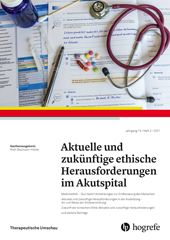Was kann ein Ethik-Forum an die aktuellen und zukünftigen Herausforderungen in einem Akutspital beitragen?
Abstract
Zusammenfassung. Ethik-Foren nach dem Modell der Stiftung Dialog Ethik haben zum Ziel, in einem Spital eine Kultur bewusster ethischer Reflexion über die aktuellen und zukünftigen Herausforderungen im Zusammenhang mit der Betreuung von Patientinnen und Patienten aufzubauen und zu unterstützen. Ethik-Foren sind nur nützlich, wenn die gesetzten Ziele auch effizient erreicht werden können. Voraussetzungen: a) Sie müssen von der Leitung einer Institution des Gesundheitswesens mandatiert und getragen werden. b) Das Unterstützungsangebot muss in den Behandlungsteams bekannt sein und niederschwellig in Anspruch genommen werden können. Ethik-Foren müssen interprofessionell und interdisziplinär zusammengesetzt sein. Dies erlaubt, Herausforderungen mit ethischer Dimension praxisnah zu erkennen und aufzugreifen. Dabei gilt es, gesellschaftspolitische Themen wie z. B. Ressourcenverteilung von denjenigen, die sich auf Institutionsebene stellen, zu unterscheiden. Primär geht es dabei darum, Unterstützung in konkreten Alltagsproblemen anzubieten, Denkanstösse zu liefern und Handlungsoptionen vorzuschlagen. Die Bereiche Therapiebeschränkungen am Lebensende, Beurteilung von Urteilsfähigkeit und Dissens über Behandlungsziele bieten sich zur Reflexion an.
Abstract. Ethics support structures – such as ethics committees or ethics forums according to the foundation Dialog Ethic – aim to develop and cultivate a culture of ongoing conscious ethical reflection in a hospital on current and future challenges related to the care of patients. In the context of limited resources ethics support structures can reach their goal only if the set objectives can be achieved efficiently. Conditions: a) They must be mandated and supported by the management board of a health care institution. b) The offer of support must be known to the health care teams throughout the whole organization and must be able to be provided in a low-threshold manner. Ethics support structures shall be composed and work interprofessionally and interdisciplinary. This allows to recognize and detect challenges of ethical dimensions in practice. Hereby one needs to distinguish socio-political issues from those on the institutional level, such as issues concerning the distribution of resources. The primary goal is to provide support in everyday problems, to provide thought-provoking impulses and to propose options for action. The domains such as end of life therapy restrictions, assessment of judgment, dissent about treatment goals or other important ethical issues are subject for further reflection.



